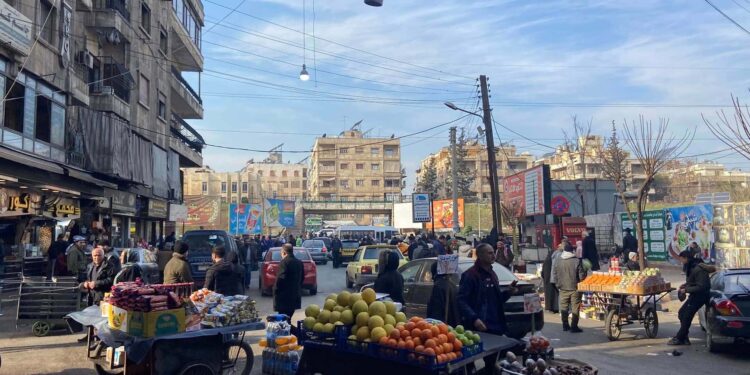Al Jazeera Net correspondents
Idlib- Syrian expatriate men and others in northern Syria hope that their country will enter a new economic era free of corruption and nepotism, following the fall of the Assad regime and the adoption of a free market economy by the new administration in Damascus, hoping to encourage the return of expatriates and revive faltering projects.
During the years of the revolution and the ensuing expansion of the armed conflict in Syria, hundreds of Syrian industrial and commercial establishment owners migrated to countries such as Turkey, Egypt, and Jordan, and established industrial and commercial establishments, benefiting from the facilities of the host countries that embraced them.
The fall of the Assad regime represented a great glimmer of hope for Syrian business owners to return to work in their homeland, or to expand their projects from neighboring countries, but their response was mixed, for reasons some of them revealed to Al Jazeera Net.
Encouraging climate
Dergham Dergham, director of a company in Turkey, says that he established his company in 2013 by obtaining facilities from the Turkish government, so that the business has expanded today to 9 Turkish states, including Istanbul, Mersin, and Kahramanmaraş.
Dergham added in an interview with Al Jazeera Net that the general climate in Syria is “encouraging and excellent” for businessmen with the fall of the Assad regime, noting that the new leadership in Damascus has shown awareness and strategic responsibility in thought that encourages all businessmen to invest in their home country.
Dergham pointed out that, as a Syrian businessman in Türkiye, he plans to expand his company’s business to include the cities of Aleppo, Homs, and Damascus, explaining that among the upcoming plans is to establish a new juice factory in Aleppo specifically.
Regarding the most important elements that must be available to encourage the return of investments in Syria, Dergham believes that they are the ease of monetary movement and the banking system, and getting rid of the bureaucracy that existed during the era of the former regime, in addition to the availability of energy, such as electricity and fuel, and a road network.
Meanwhile, Saeed Mazik – owner of a children’s clothing manufacturing company in southern Turkey – believes that Bashar al-Assad’s rule was based on expelling investments and projects, in light of administrative corruption and control over livelihoods, which prompted hundreds of businessmen to leave the country, in search of the elements of industrial work. And commercial.
Mazyek confirmed – in an interview with Al Jazeera Net – that he is preparing to restart his facilities in the Aleppo countryside after the regime was ousted, noting that the new government issued reassurances and positive messages to investors so that they can return to the country and contribute to the movement of the Syrian economy.
Mazik looks forward to transferring all his industrial work outside the country to inside Syria during the coming period.
The power of the deposed regime
Syrian businessmen who preferred to remain in the country suffered from the influence of the authorities of the ousted regime, especially customs patrols and security personnel, to the point that they started sharing profits with them, as many merchants in the city of Aleppo, the economic capital of Syria, narrate, which exposed them to loss and eventually the stopping of their projects, which mainly suffer from the absence of the necessary components. Continuity such as electricity, security and stability.
Muhammad Baradei, a women’s clothing merchant in the city of Aleppo, says that 25% of his store’s income used to go to pay royalties and taxes during the era of the previous regime, adding that customs patrols did not leave his store and visited him on a daily basis to obtain money.
In an interview with Al Jazeera Net, Baradei pointed out that his profits were barely enough to secure his family’s daily expenses and pay electricity bills and high taxes on his store, stressing that the previous government was dealing with the merchants with gang logic.
Today, Baradei hopes to revive his store by importing various clothes from Turkey, with the change in the general economic situation and the liberation of the markets from the dominance of the previous regime, pointing out that the general climate bodes well and the return of sales movement is better than before.
The new government in Syria, represented by the caretaker Ministry of Economy, shows flexibility and openness to revitalize the economy exhausted by the war, especially after the Minister of Economy, Basil Abdel Hanan, called on Syrian businessmen who were displaced since 1960 to return to “Free Syria” in order to contribute. In construction, it is an indication of Damascus’s new direction.
Economic analyst Abdul Salam Al-Omar says that Syria is currently a fertile environment for economic investment, especially in the field of urbanization and housing within the reconstruction process, with expectations of the return of thousands of displaced Syrians during the coming period.
Al-Omar points out, in a comment to Al Jazeera Net, that the issue of allowing businessmen, including merchants and industrialists, to trade via the dollar and the Turkish lira, in addition to the Syrian pound, is a positive indicator that attracts economic projects, and a catalyst for the freedom of the market economy.
Al-Omar believes that the majority of businessmen are awaiting the availability of additional indicators for investment in the Syrian markets, most notably the opening of banks on a large scale, in addition to rebuilding the infrastructure and securing the main energy resources of electricity and fuel.



